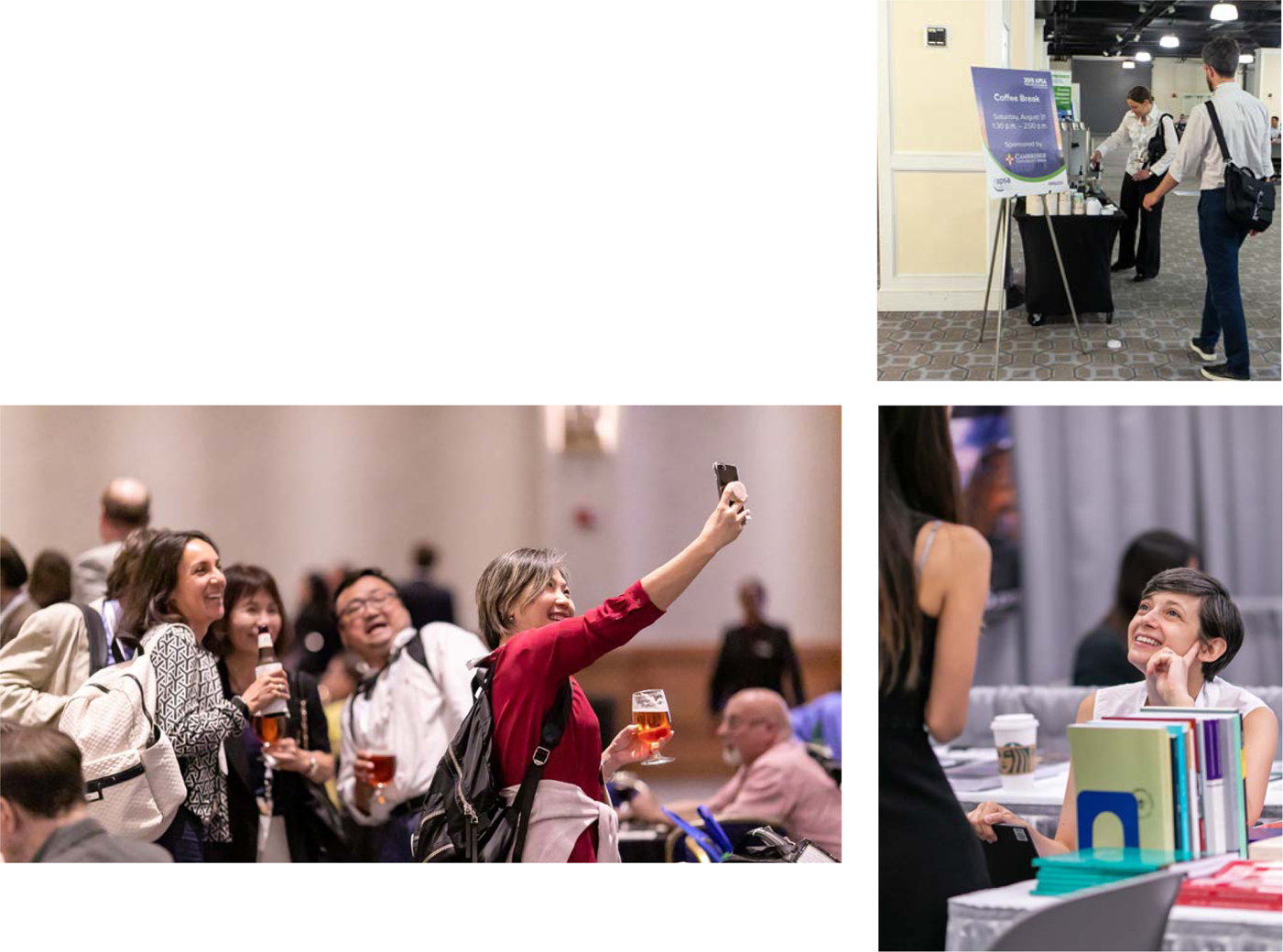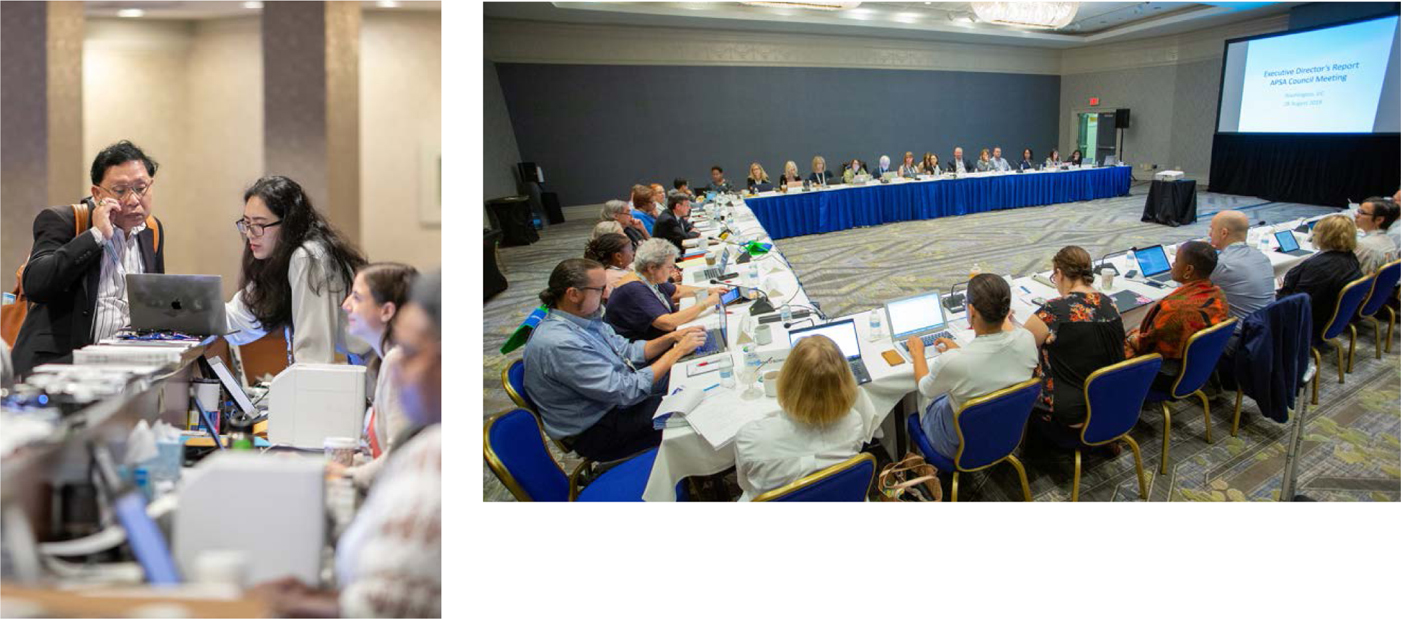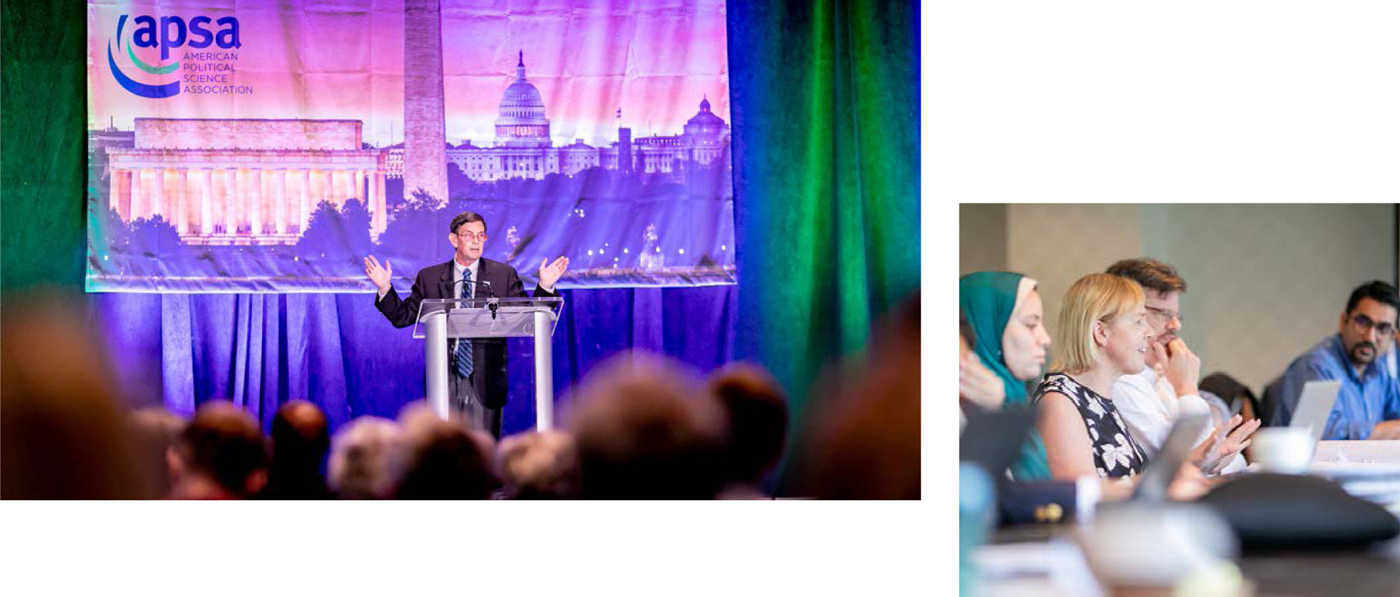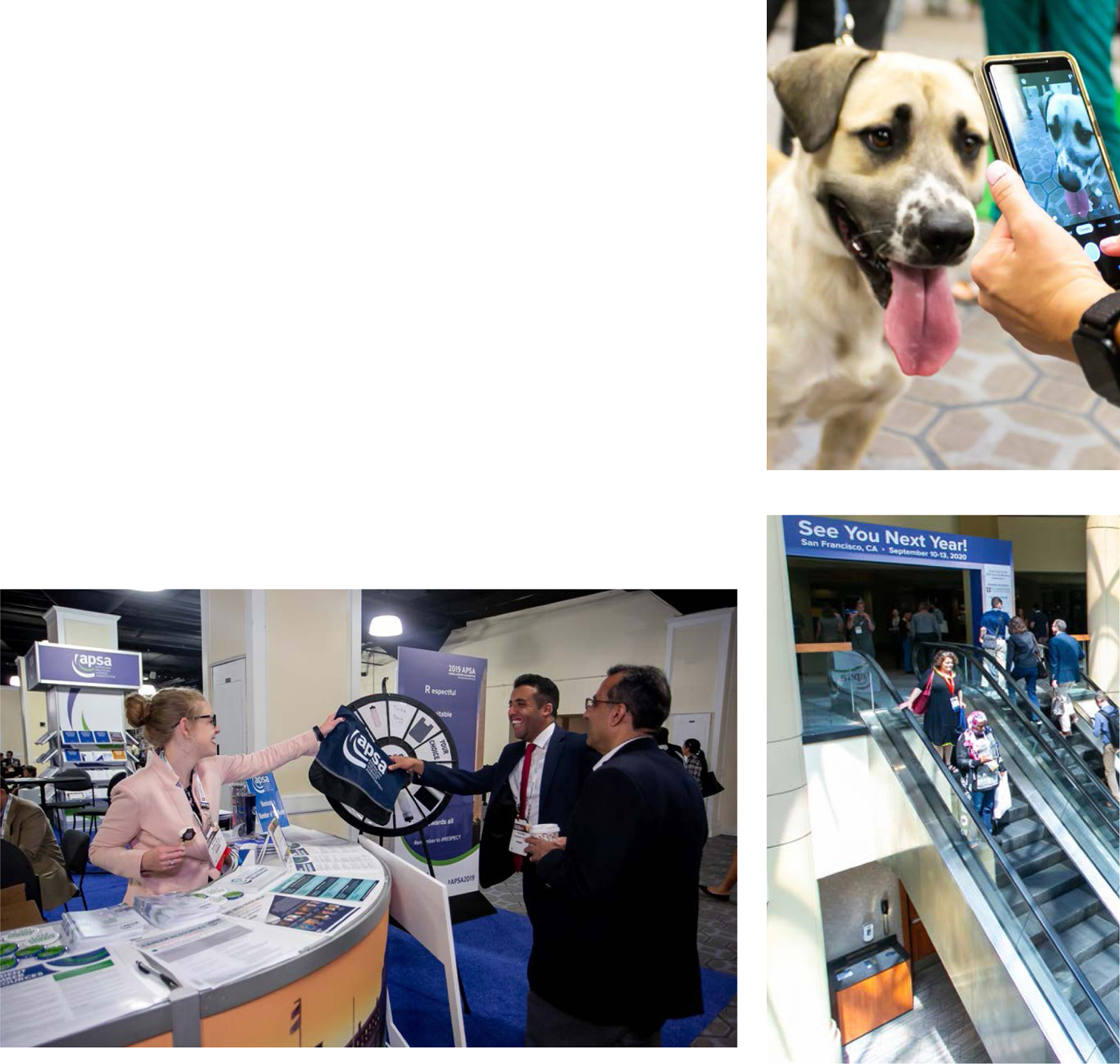APSA welcomed more than 7,000 political science faculty, students, policymakers, journalists, and citizens for the 115th APSA Annual Meeting & Exhibition in Washington, DC from August 29–September 1. The 2019 annual meeting program chairs, Amel Ahmed, University of Massachusetts, Amherst, and Christopher Sebastian Parker, University of Washington, organized the conference theme, “Populism and Privilege,” and hundreds of volunteers helped to create four days of programming, including more than 1,200 panels, roundtables, and special events for scholars to present, learn, and network at the world’s largest political science conference.

Above: Reunited attendees celebrate with a selfie. Top Right: Attendees recharge at the Coffee Break sponsored by Cambridge University Press. Right: An exhibitor speaks with an attendee in the Exhibit Hall.
Activities began on Wednesday, August 28, with 18 pre-conference short courses. These programs—organized around professional development, sub-fields, or themes—allowed participants to explore topics of interest in a focused environment. The day concluded with the APSA Awards Ceremony, where the association celebrated and recognized 31 individuals for notable career and research achievements.

Above: The APSA Council meets on Wednesday, August 28, in advance of the annual meeting. Left: The Registration Assistance desk in the Marriott Wardman Park.
Thursday, August 29, marked the official beginning of the meeting and featured two breaking news panels, “Immigration and the Realignment of European Politics” and “Trump, Constitutional Crisis, and American Democracy.” The program chairs also selected several films related to the conference theme for screening and discussion at the annual meeting. The first of these films, Knock Down the House, screened on Thursday afternoon. The day wrapped up with the 115th Presidential Address, “What Good Could Political Science Do? From Pluralism to Partnerships,” delivered by APSA President Rogers Smith, University of Pennsylvania. The address was followed by the opening reception.
On Friday, the program chairs hosted a special panel series, “Diversity, Equity, and Inclusion in the Discipline: Shared Commitments, Institutional Challenges,” which focused on practical strategies to promote diversity, equity, and inclusion within the discipline. Panels included the “Diversity and Inclusion Hackathon Reunion Roundtable,” “Recruiting and Supporting Faculty of Color,” “Roundtable on Advancing Gender Equity in the Profession,” “Roundtable on the Identity Politics of Political Science,” and a presidential plenary that included past, present, and future APSA presidents, including Dianne Pinderhughes, Rodney Hero, Kathleen Thelen, Rogers Smith, and Paula D. McClain. The day also featured two additional film screenings: Searching for Andreas: Political Leadership in Times of Crisis and What is Democracy?.

Above: APSA President Rogers Smith delivers the 115th Presidential Address, “What Good Could Political Science Do? From Pluralism to Populism.” Right: An attendee speaks at a breakout session in the Omni Hotel.
Saturday featured the second-annual TLC at APSA event. Hundreds of attendees gathered for the full-day event, organized around the theme “Political Science Education in the Time of Resurgent Populism and Privilege.” The event provided an interactive forum for scholars to share innovative tools for political science education and research on the scholarship of teaching and learning. Lynn Pasquerella kicked off the event with her keynote, “Advancing Liberal Education and Civic Engagement Amidst Critics, Skeptics, and Trolls in a Post-Truth Era.”
Attendees also enjoyed a number of networking opportunities and special events, including the International Attendee Reception, the Reception Honoring Women of Color in the Profession, APSA’s Evening of Appreciation, the Graduate Student Happy Hour, the RBSI/Minority Fellow Program Reception, various university alumni receptions, an ice cream break, a “puppy social” featuring adoptable dogs from the Lucky Dog Animal Rescue, and a variety of APSA Organized Section meetings and receptions. Many attendees also visited the APSA Career Center, which featured panels and eJobs interview services, the onsite interview space for APSA members and university departments. Many attendees also took advantage of eco-friendly options while navigating the conference, including the interactive online program, the mobile app, and the ePDF program.

Above: Ralphe Bunche Summer Institute (RBSI) scholar Jakini Ingram presents her project, “The Politics of Prison: The Intersection of Educational Disparities and Length of Sentencing” at the iPoster Session on Saturday, August 31.
The 2019 meeting also continued the use of APSA’s iPosters in the exhibit hall. iPosters provided an interactive experience for poster authors and attendees alike, allowing them to enlarge graphics and include audio and video clips in their presentations. In addition to viewing posters onsite in DC, APSA attendees and members can view the 2019 Annual Meeting posters online at https://connect.apsanet.org/apsa2019/iposters-2/. iPosters are available online before, during, and after the annual meeting, providing a wider window of engagement for authors to receive feedback, as well as a convenient way for APSA colleagues to share feedback or find opportunities for collaboration.

Above: Attendees spin the wheel to win swag at the APSA Lounge. Center Right: A puppy poses for a photo at the “Take a Paws” Puppy Social in partnership with the Lucky Dog Animal Rescue. Lower Right: Attendees departing the Annual Meeting on Saturday evening.
The APSA exhibit hall featured more than 65 organizations—including political science publishers, news and media outlets, educational technology companies, research organizations, foundations, and nonprofit organizations. A robust variety of sponsored social events on the exhibit show floor also provided valuable opportunities for networking outside of the sessions, including the professional headshot station, which allowed APSA attendees to have new professional photographs taken. As always, the APSA Lounge offered a comfortable space where attendees could meet to discuss issues of mutual interest.
APSA would like to express our deep appreciation to our sponsors for their generous support of this year’s annual meeting: Cambridge University Press, CQ Press, College Board, Department of Political Science at the University of Gothenburg, Ewing Marion Kaufmann Foundation, Pearson, and Pi Sigma Alpha.
We are very much looking forward to our next annual meeting in San Francisco, CA, on September 10–13, 2020. See you there!


